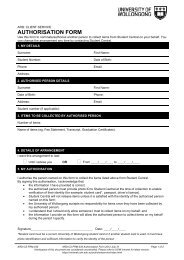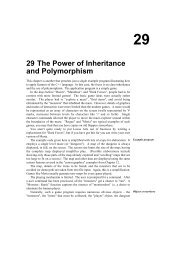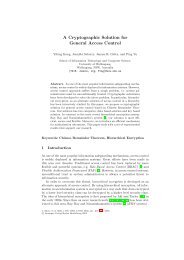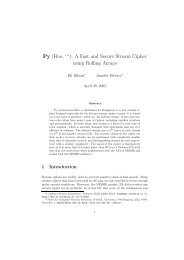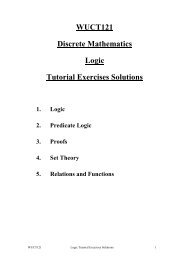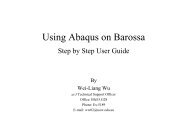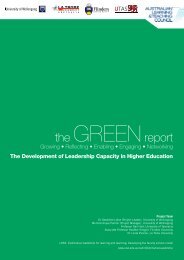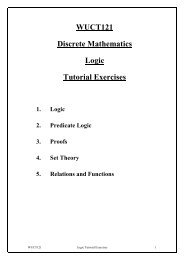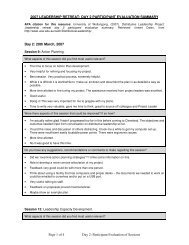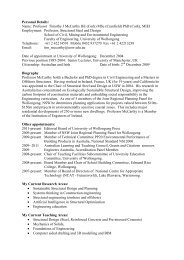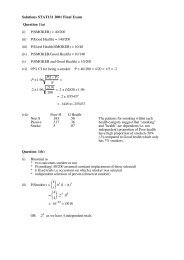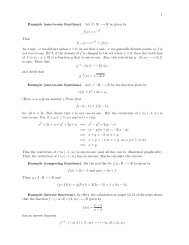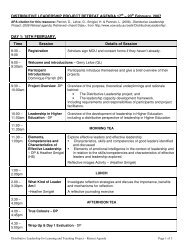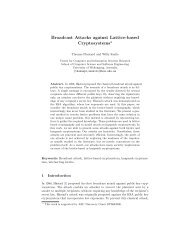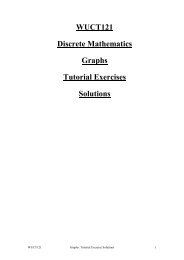india author m 1- a-nan - University of Wollongong
india author m 1- a-nan - University of Wollongong
india author m 1- a-nan - University of Wollongong
Create successful ePaper yourself
Turn your PDF publications into a flip-book with our unique Google optimized e-Paper software.
RAIZADA, HARISH. "Double Vision <strong>of</strong> Fantasy and Reality in Arun Joshi's Novels": 69-<br />
103. (5) PATHAK, R. S. "Human Predicament and Meaninglessless in Arun Joshi's Novels":<br />
104-142. Amplified version <strong>of</strong> "Arun Joshi's Novels: An Indeterminate Search for Meaning in<br />
Life," in Arun Joshi: A Study <strong>of</strong> His Fiction, edited by N. Radhakrish<strong>nan</strong><br />
(Gandhigram,Tamilnadu: Gandhigram Rural Institute, 1984): 44-63 (6) MATHUR, O. P. and<br />
G. RAI, "Arun Joshi and the Labyrinth <strong>of</strong> Life": 143-54. (7) GURUPRASAD, THAKUR.<br />
"The Lost Lonely Questers <strong>of</strong> Arun Joshi's Fiction": 155-67. (8) JHA, MOHAN. "The<br />
Foreigner: A Study in Innocence and Experience": 168-75. (9) RADHA, K. "From<br />
Detachment to Involvement: The Case <strong>of</strong> Sindi Oberoi": 176-85. Reprinted as "From<br />
Detachment to Involvement: The Career <strong>of</strong> the Chief Protagonist <strong>of</strong> Arun Joshi's The<br />
Foreigner." In Contemporary Indian Fiction in English, edited by K. Ayyappa Paniker<br />
(Trivandrum: <strong>University</strong> <strong>of</strong> Kerala, 1987): 81-90. Traces the development in the character <strong>of</strong><br />
Sindi, who begins with no attachment to parents or country. His relationship with June marks a<br />
breaking down <strong>of</strong> the barriers <strong>of</strong> detachment. It is the impassioned plea <strong>of</strong> Muthu, a poor man<br />
in Bombay, which makes Sindi give up his indifference. Briefly compares Sindi with the<br />
protagonists <strong>of</strong> The Outsider by Camus and Kamala Markandaya's The Nowhere Man. (10)<br />
PREMPATI, D. "The Strange Case <strong>of</strong> Billy Biswas: A Serious Response to a Big Challenge":<br />
186-93. (ll) MOHAN, DEVINDER. "The Image <strong>of</strong> Fire in The Strange Case <strong>of</strong> Billy<br />
Biswas": 194-209. See MOHAN above. (12) ABRAHAM, JOY. "Vision and Technique in<br />
The Appprentice": 210-22. Novelists like Joshi and Anita Desai are trying new paths,<br />
testifying to the vitality <strong>of</strong> Indian English fiction. Abraham analyses the narrative pattern <strong>of</strong> The<br />
Aprentice in tabular form. (13) REDDY, V. GOPAL. "The Apprentice: An Existential Study":<br />
223-30. Thematic approach. Ratan's alienation is two-fold; he is alienated from society, and<br />
later from his true self when he conforms to the false values <strong>of</strong> the marketplace. Opines that<br />
The Apprentice is influenced by Camus's The Fall. (14) PRASAD, HARI MOHAN. "The<br />
Crisis <strong>of</strong> Consciousness: The Last Labyrinth": 231-39. (15) SHARMA, SHAM SUNDER.<br />
"The Two Worlds in The Last Labyrinth": 240-48.<br />
A.N. DWIVEDI, "The Novels <strong>of</strong> Arun Joshi: A Critical Study": 309-318. in DWIVEDI,<br />
A.N. (ed) Studies in Contemporary Indian Fiction in English, Allahabad: Kitab Mahal, 1987,<br />
pp.358<br />
DUTTA, PADMA. "Problems <strong>of</strong> Individuation: A Critique <strong>of</strong> Arun Joshi's Use <strong>of</strong> Symbols<br />
and Archetypes in The Last Labyrinth" Journal <strong>of</strong> Indian Writing in English, 18.1, (1990): 31-<br />
40.<br />
HEGDE, M.G. "Arun Joshi's Lala Shri Ram: A Study" Journal <strong>of</strong> Indian Writing in English<br />
17.2 (1989): 18-22.<br />
IYENGAR, K.R.SRINIVASA. "The Fiction <strong>of</strong> Arun Joshi" The Humanities Review 3.2:<br />
(1981):39-40.<br />
JAIN, J. "Foreigners and Strangers: Arun Joshi's Heroes" Journal <strong>of</strong> Indian Writing in English<br />
5.1 (1977):52-7.<br />
JAIN, JASBIR. "Foreigners and Strangers: Arun Joshi's Heroes." JIWE 5, no.1 (1977): 53-<br />
57.<br />
Joshi's heroes are lonely men in search <strong>of</strong> a meaning in life. None <strong>of</strong> them is religious,<br />
but they are humble in learning the lessons life teaches them. Ratan Rathor, <strong>of</strong> The Apprentice,



